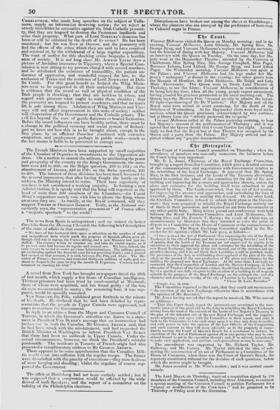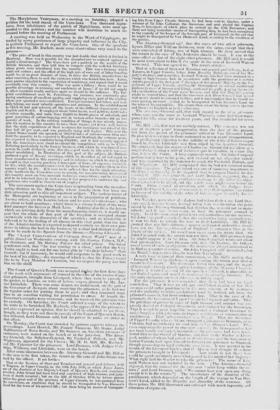The Lord Mayor, on Timrsday, received a requisition signed by
110 members of the Common Council, including. three Aldermen, to summon a special meeting of the Common Council to petition Parliament for a "repeal or modification of the Corn-laws ;" and he promised to fix Thursday or Friday next for the discussion.
The Marylebone Vestrymen, at a meeting on Saturday, adopted a petition for the total repeal of the Corn-laws. Ten thousand signa- tures, from inhabitants of the parish of Marylebone, were soon ap- pended to this petition; and the number will doubtless be much in- creased before the meeting of Parliament.
A meeting was held on Wednesday in the Ward of Cripplegate, at- tended by many gentlemen of large property and influence in the City,
to petition Parliament to repeal the Corn-laws. One of the speakers at this meeting, Mr. Duthoit, made some observations very much to the purpose- " The price of bread in this country was just double that which it fetched in Hamburg. How was it possible Ihr the manufheturer to contend against so fearful a disadvantage ? The Corn-laws put a padlock on the mouth of the British labourer, and then told him to emnpete ritIL the well-fed finteignr, whose goods were introduced into the eonntry. This was a tyranny which could not endure; awl the effect of the high rate of eorn and of other taxat'ion would be, at no great distance of time, to drive the Ilrit ish manufarturer to other countries, there to seek the existence which was denied him here. Again, 8oine parties objected to the exportation of machinery, and argued that it would eventually ruin this country. This WILS quite a fallacy : there could be no possible advantage in retaining our machinery at home : if we did not it, other countries would, and here again we should be the sufferers. The Im- perial establishment near St. Petersburg, Mr instance, was constantly pro- ducing machinery of excellent quality, and supplying every part of the country where new spinnerk.s were established. Fore 'em countries. had taken, and were daily taking, our most valuable operatives and artisans. In the establishment to which he had just referred, all the beads of the different departments were English and Scotch. It employed about 3,000 hands, used 2,500 to 3,000 bolos of cotton annually, and made from .25,000 to 30,000 pieces of sail-cloth, and great quantities of cotton-bagging, and in various other branches (lid an im- mensity of work. In the existing condition of things, it was utterly impos- sible for masters in this country to raise their wages; yet it WaS t1cil Iowan that the daily expenditore of file; r workmen for sustenance was mist:), at lids time full 50 per rent., and was gradually risitig still Iii!•.her. This year the United States would use upwards of 300,0110 bales of cot ton—more than one- third the quantity to he exported to England and Scotland, the extreme quan- tity exported to these eountities being 900,0011; and it had recently app.:web that the Americans were about to extend the competition with US to Chim:. Referriim particularly to the hosiery business, with which lie was himself vim- fleeted, he could distinctly state that the export trade in this .m uric was a ow almost annihilated. In illustrathm of this part ()I' the subject, Al t% Duthoit produced a pair of Saxony stockings, %bidet' be described as all hut equal to those manufaciurell in this country ; and in reference to %%idyl' he stated, that be could in that country purehase it dozen pair of then!, all exit:ft -(es ineluded, for 2ls, while the manufacturer's meet thr mere labour hi makiwr them in thb: country would be 28s. II it were to be stitierel that for the single tolvantage of the *landlords the Cora-laws v•ere to remain, the manufitet nritt,1 interi.sts id' this country must ere long succumb to forib;.m competition ; and he siani'd to glad to be inlilrmed luny, in such a ease, it %■ as proposed to itimumutain the vast population Mu) would be thrown unit of employ The movement against the Corn-laws is spreading from the manutlie- tiring districts to the Metropolis, where usually there has been too little attention paid to this all-important subject. The various trades of the Metropolis are beginning to ntoye in the preparation of petitions. Among others, are the London bakers and keepers or coffeehouses, who are about to hold meetings; whilst there is a rim mug eyeling of the sonic kind tunongst the factors at Mark Lane. Judging also front the letters which are arriving daily from the innuttfacturing districts, it would ap- pear that the whole of that part of the kingdom is occupied almost exelasively with the discussion of the question ; and so irresistible is believed to be the feeling of all classes on this vital point, that, the fate of the Administration is expected to depend entirely on their own pru- dence in taking the lead in the business, by a clear and distinct declara- tion to be made in the Speech from the throne.—Norning Chronicle.
The "Loyal Conservatives of Coleman Street Ward" met at a public dinner on Wednesday evening, with Mr. George Palmer, M.P., her chairman. and Mr. Horsley Palmer for chief orator. The latter gentleman said, that "he was coming to a close," and that the City Tories ought to look out for one better able to "do their behests " than himself; but if necessary, he would still coliperate in the good work to the best of his ability,—the meaning of which is, that Mr. Palmer would like to be Tory Member for London, but we suspect the party has laid him on the shelf.



























 Previous page
Previous page